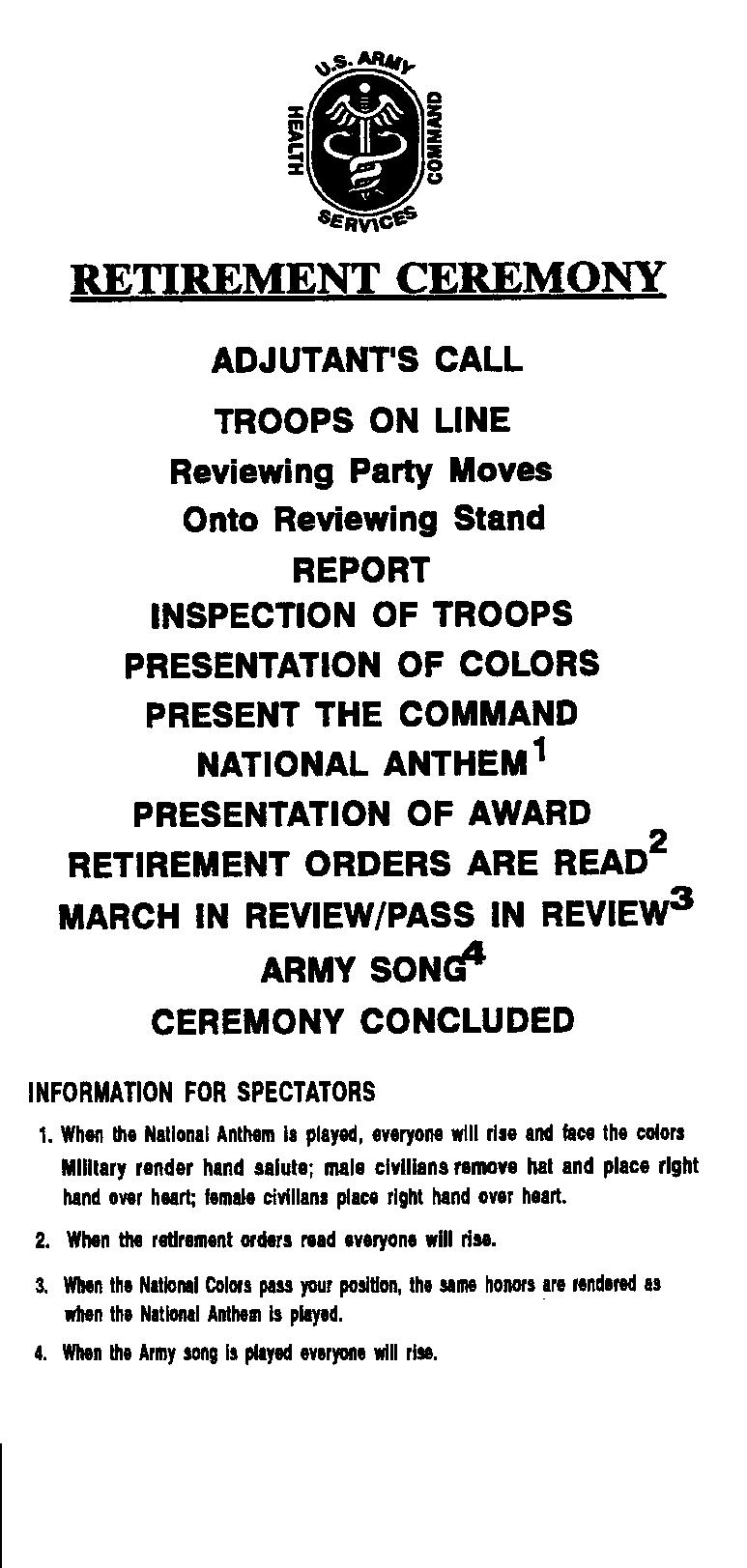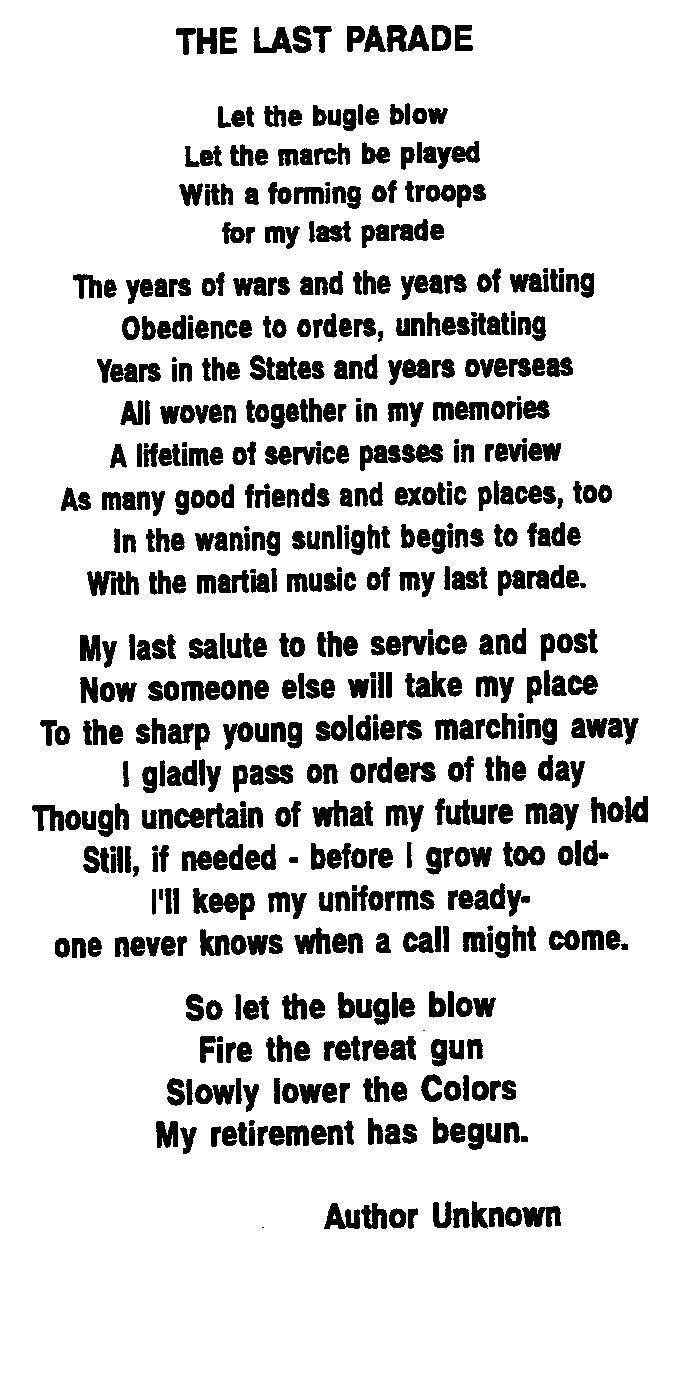1st Sergeant Felipe Delgado Aguillon
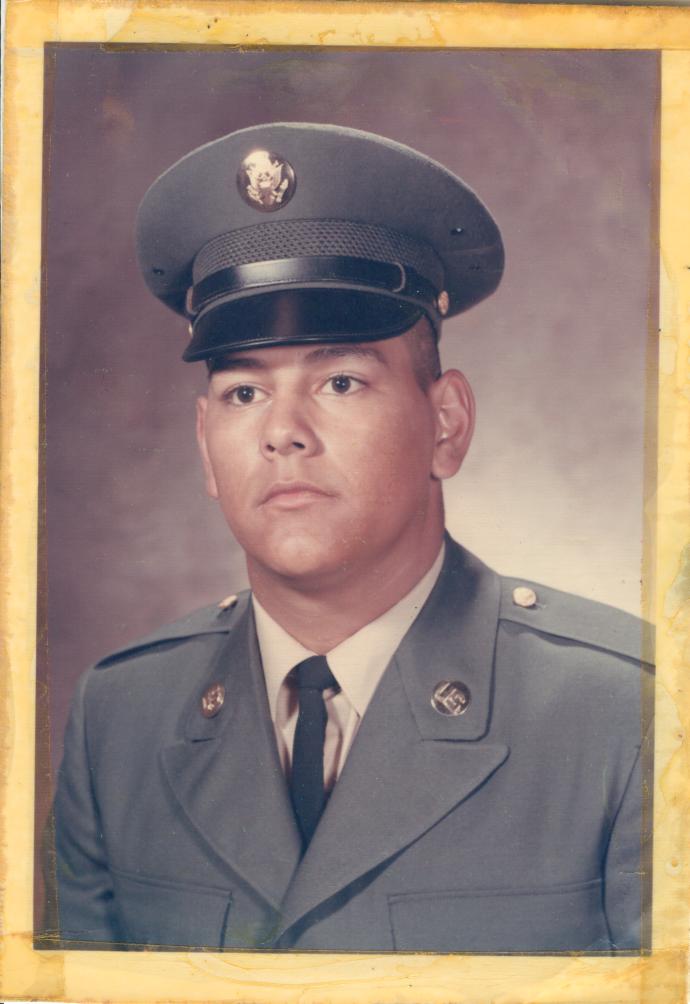

First Sergeant Felipe Delgado Aguillon was born on the 21st of November 1948 in San Antonio, Texas to Julia Delgado and Mateo Aguillon. He is the fourth of seven children and has lived his entire childhood in San Antonio. He attended Kennedy High School and graduated in 1969, after he decided to enlist into the United States Army on 17 February 1970, and at age 18, he left to fight in the Vietnam War. He did basic training and AIT at Fort Lewis, Washington, and while being in the Army for 24 years, he has been stationed in Vietnam, Hawaii, Fort Laurie, Kansas, Fort Jackson, South Carolina, Stevensville, Texas, Germany, South Carolina, and back here in San Antonio, Texas. First Sergeant Aguillon attended College and married his present wife, Elena Perez Aguillon in San Antonio on February 14, 1998. He has six children: Becky, Felicia, Raquel, Ana, Matthew, and David. First Sergeant Aguillon has retired from the Army after 24 years in Infantry. His hobbies today include: golf, wood projects, racquetball, spending time with his wife, and ironing! Today, he teaches at Memorial High School.
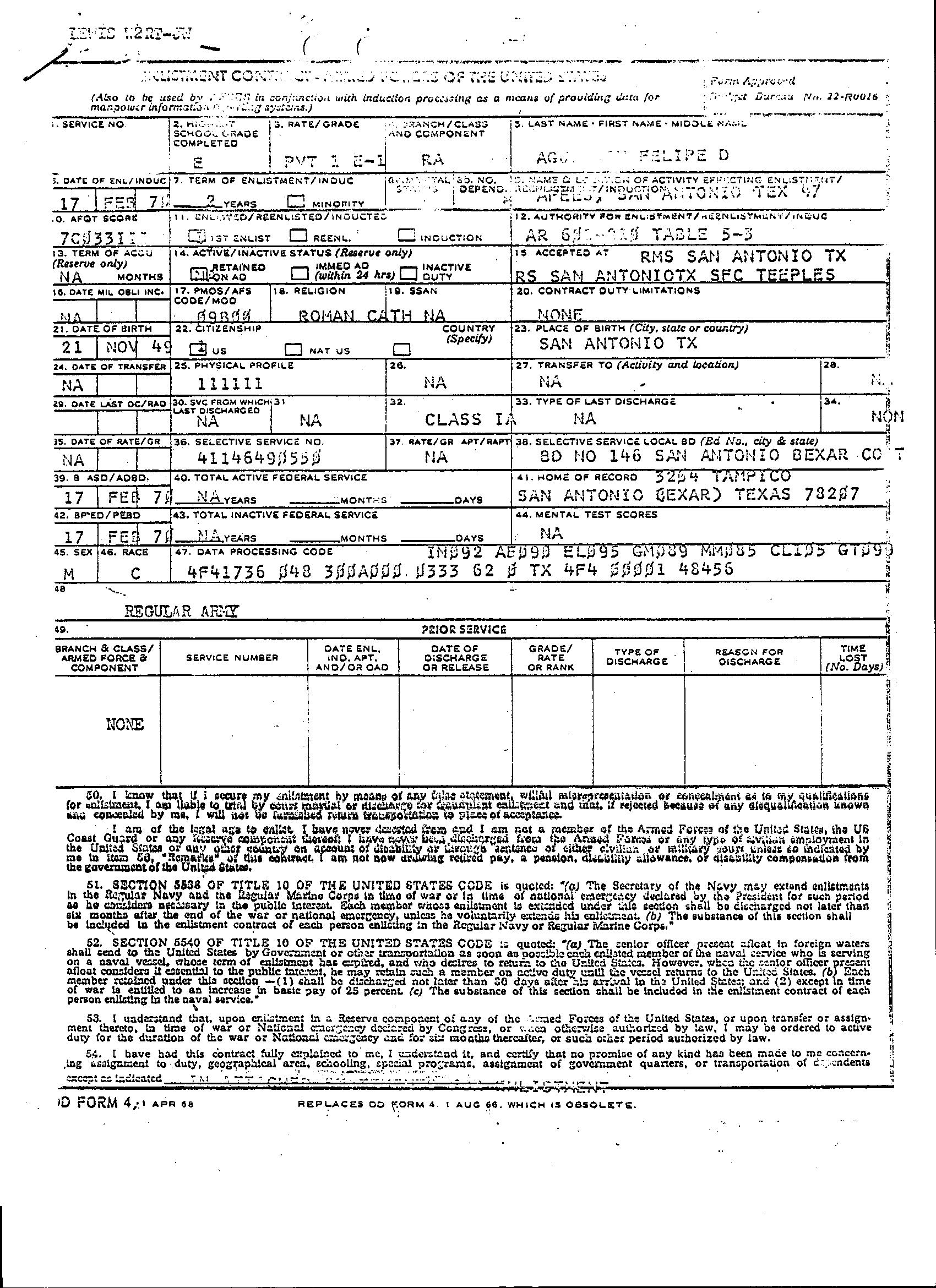

(First Sergeant Aguillon starting interview)
Good afternoon, thank you for coming over and inviting me to do an interview with you. I find it very interesting that a young person like you would wanna know about Vietnam, and it's very refreshing to know that somebody's gonna take the time to listen to the old folks. So, without further ado, here we go. Give me your first question.
Why was there a war in Vietnam?
Why was there a war in Vietnam? Boy that's a hard one. I, I really don't know why there was a war. A lot of people say because we were fearing the Vietnamese were going to take over, and the a domino theory that they might come over and take over America and stuff. I really don't know. At the time I was in high school and all I know is that I enlisted and here I am in the middle of the stuff so why? I really don't know.
Did you understand why you were going at the time?
No, I did not understand it. (smiles) And its really funny that you asked that because at that particular time, a lot of the people who were graduating were joining the military. It was a very patriotic time I guess. There was really no jobs and I really didnít have a trade that I could go into so. My brother joined the military, my cousin joined, my best friend joined, so, I decided to join also.
Were you drafted to be in the war?
No, I was not drafted. I volunteered. I had a sequence number of 279 I think, and that means that I probably would not have been drafted that year. I really didnít want to go to college but like I said. Everyone was enlisting so I decided to join also.
What was your day like while being in basic training?
Basic training was a lot of fun. It was. I played football while I was in high school so it was kind of basically the same. We would do a lot of physical training, we would get up early in the morning. We would run and that was probably one of my favorite things to do. We would call cadences while your running and that was veryÖit, it was just a lot of fun. It brought all the people together and stuff. You bring all these people from different parts of the world and we would put them together and stuff and we would just form this thing called a platoon and a company. And we just had a lot of fun. It was rough at times and very demanding, but it was a lot of fun also.
Did you feel the war could have been prevented?
Do I feel the war could have been prevented? Ya'know, I really don't have an opinion on it because I really don't know what the war was about...(pause) I really don't know because like I said, I really don't know why we were at war and if the war and if the war could have been prevented. I guess anywhere it could have been prevented. But I per se don't have a say yea or nay because I really don't know the particulars of it.
What were your feelings towards the war once you arrived?
My feelings toward the war? Feelings towards the war, I don't know if I had any feelings toward the war. I know I was scared, I was afraid of being there and stuff.
Why were you scared?
Well because, it's really funny, (smiles). While you go through basic and you go through AIT {Advanced Individual Training} and stuff, the Army back then would kind of brainwash you to think that your were really tough and you would be able to do all these things and stuff and my MOS {Military Occupational Specialties}, my job. In the Army, they call it an MOS that means, what kind of job you had. I was an infantry man, so me as an infantry man, I thought it was fun because we used to go out and play Army games, we used to shoot all the weapons and throw hand grenades and have bayonet fights and I thought all of that was really neat and cool and I thought I was really bad. But then, when I finished basic and AIT I came back to San Antonio for 14 days leave before I went to Vietnam. And my best friend Richard {Ricardo} Mendolia got killed so it was kind of a wake up call, say wow, they're people getting killed out there. At that time, I was really afraid to go. So, I was in fact, I was AWOL {Absent Without Leave} for 20 days. I tried every way that I could to get out of it because I was really afraid. But eventually, ended up going, got an Article 15 and here I go off to Vietnam.
What's an Article 15?
An Article 15 is when you do something (laughs) wrong in the military. It's like if you're speeding or you get in a fight, or whatever. The San Antonio Police will give you a ticket. In the Army, we call it a UCMJ, Uniform Code of Military Justice, it's called a UCMJ. And that's a type of punishment that they'll give you. And at that particular time, I got an Article 15 for being AWOL for 20 days. They gave me a dollar a day fine and reduced to E1 and here I go to Vietnam so...that was...(smiles and laughs)
What was your job in the war?
My job was a 60 gunner machine gun. Also, it's called an M60 Machine gun. If you ever saw the movie Rambo, when Rambo comes out and is shooting all those machine guns and stuff, that's what I did. I was assigned to the Weapons Platoon as a M60 Machine Gunner.
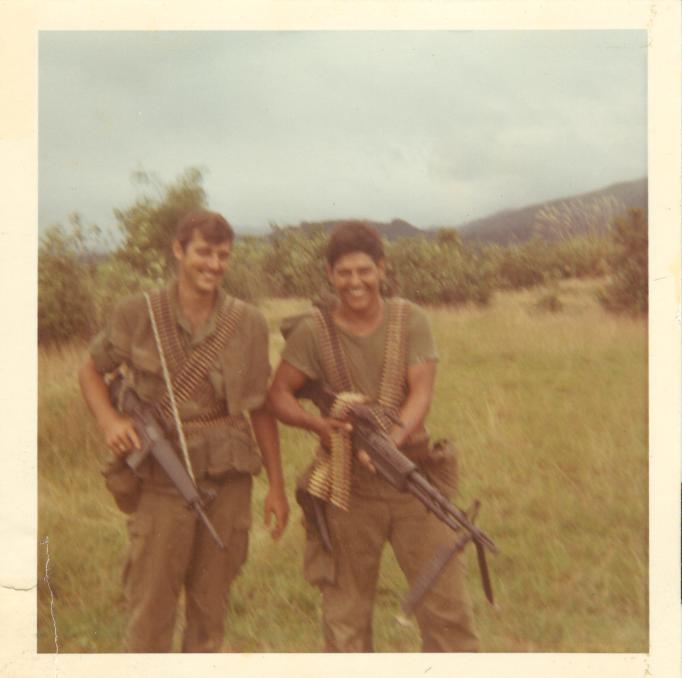
Did you write to anyone while being in the war?
Oh yes. I wrote to my mom, I wrote to my cousins, I wrote to my sisters, brothers. You know, itís really funny. When you're in a situation like that and stuff, you wanna write to everybody. Getting mail is the most important part of being anywhere because you just just feel so lonely, so isolated and stuff. So writing and receiving mail was really really important for all of us.
Did you save any letters?
I did, but it's really funny, (smiles). I saved them but don't know where they're at. I don't know if I left it with my mom's or lost them when I moved or, but. I have a couple of, I have all. It's very funny cause letters I don't have but I have all my records. When I first went in, when I got promoted?

What missions did you go while being at the War?
Oh, we went on a lot of missions. We went on recons, we went on ambushes, we went on assaults. We had combat assaults, we had vehicle assaults. You name it, we did it. We did search and destroy, clean up. Once we had our helicopter and it was shot down and we had to go secure it and we ended up saving two pilots. It depends on what day your mission was for the day. You never knew what you were going to be doing the next day, but you were always ready to, to do any of the things they wanted you to do.
Was there a time where you thought you were going to die? When?
Oh yea. There was several times...in fact, I'll tell you a really funny story, well, it's a funny story now. When I first got there, I could remember, and it's really weird. Because most people you talk to about Vietnam War, don't want to talk about it. And I usually don't but I, I decided to do this with you because I think it's a point where young people nowadays know why we do it, how we do things and stuff. My first mission, they put me onthe back of this thing called the Chinook helicopter and of course, this was my first time I was going out and stuff, I was really, really nervous about what I was going to do and how...you know, you get all this training and stuff and you don't know how you're gonna, how your gonna react to different things. If your gonna be afraid, if you'll be able to do what you were trained to do, whatever. So, anyway, we got in this helicopter and were going to land on this area called Tin City {nick name}. And as we landed, I just got so scared that I threw up all over myself. Well, needless to say, there was nowhere where you can go shower and clean up or whatever. And you see that no one wants to be around you and once we landed, we got out and we set up a perimeter. A perimeter is where you stay and you dig your fox holes and make sure that if people shoot at you, you can jump in there and you won't get hit, and later that night, we had a, a patrol when out. And they made contact. They engaged contact and so, my platoon leader at the time, gave me some, we call them flares and if you use a flare, you pop the flare and it illuminates cause it was at night and when I was going from you know, from where they were to where they were fighting, I could see myself crying and dropping stuff. And just, it was very embarrassing because everyone makes fun of you and stuff and of course, we all kid around with it and stuff. But now that I think aobut, it's very funny, but at the time I thought for sure I was gonna {die}. Here I am, my first day and I'm gonna get killed and it was kinda, it was just a weird feeling.
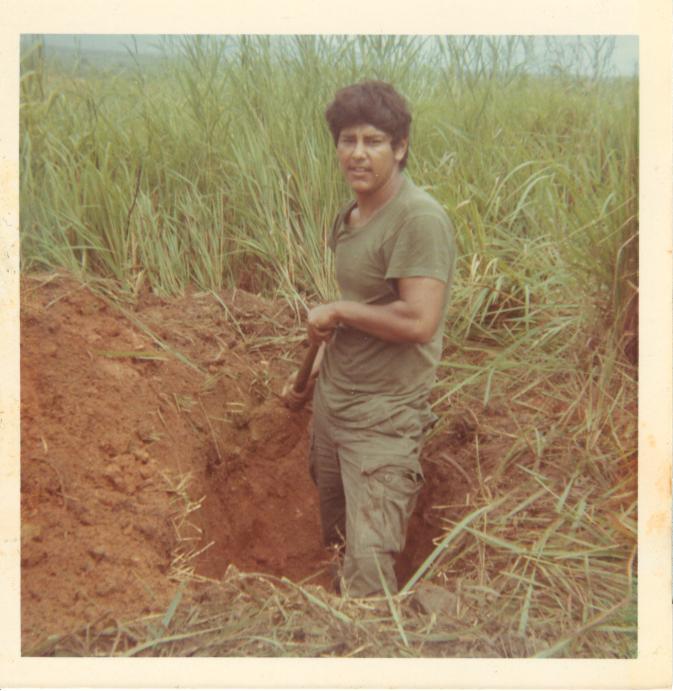
So this happened the first day?
The first mission. That first mission, I was in that country for about probably two weeks, something like before I went on my first mission.
What are the most vivid memories that you gathered while being in the war?
I guess, the area itself. You know, Vietnam was such a beautiful, beautiful {country}. A lot of people don't realize it. If I ever get another chance to go back, I would really like to go back. The sunsets the sunrises were beautiful. It was really weird because your, lets say, you went on a mission and whatever, you went through all this and your fighting, but at the same token the following day you would just see this beautiful scenery and you'll meet these beautiful people and you'll go...why are we here? Why are we going through this stuff? And the look on the people's faces and it was really something. It really sticks with you and you kinda go like...you know, shouldn't I be going through this? or why are they going throught this? Most of the people, you know, were not involved in anyway or another. They were just happened to live there and they were nice to us and we were nice to them, but like anything else, you had the bad guys and it was kind of hard because you couldn't you know, determine whe was the good guys from the bad guys. Sometimes, I guess that's what I think about the most. The people and why they were caught in the middle of it.
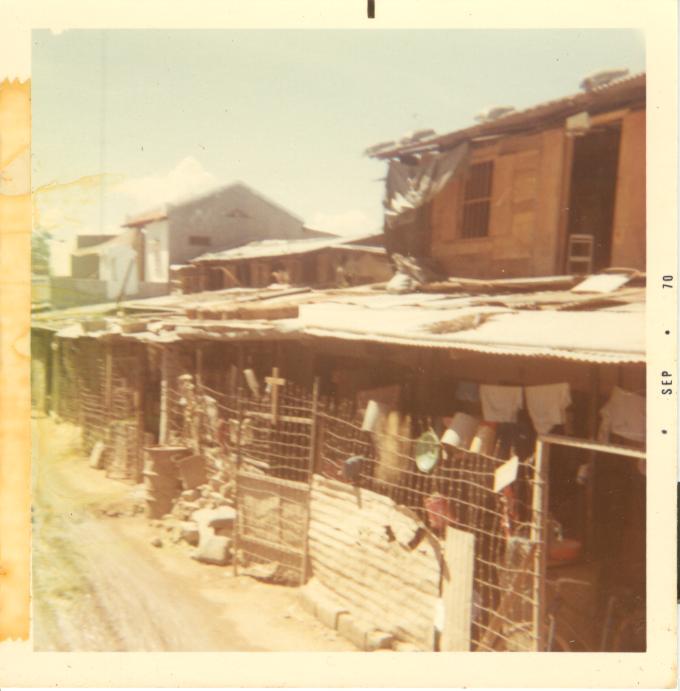
Did you feel guilty when you survived while others died?
Yes!
Why?
You know, it's really ironic when you and I first started talking about this, I'm pretty sure you remember I kind a got a little emotional about this. It's really ironic because you feel like you don't deserve to come and then your buddies or your pals that didn't make it you go like, you know, you feel guilty becasue your coming back or if you have a girlfriend, if you get married, if you have kids, and then you go like, its not fair. Why me and why not them? And I think that's one of the things we all, that all of us that are in combat or in the Army or whatever and I guess you feel, it takes a while before, well no, you never get over it, its really...I think...
Do you want to stop for a little bit?
...no, we'll continue.
What is the history of your nickname?
(Laughs) Oh that's funny. My nickname name. My nickname is Aguillon, AG. AG came from, because I was an Assistant Gunner before I became an M16 Machine Gunner, I was an Assistant Gunner. Okay, and like I was saying, AG was my first nick because I was an Assistant Gunner and then AGGIE came because I came from Texas, so everybody called me AGGIE. And then, the main reason cause they could not pronounce my last name Aguillon. So they figured AG or AGGIE was a lot easier and me being here from Texas, so everybody called me AGGIE so it just got stuck with me. And it's really weired because when you were doing your research and you showed me the Internet link that you were to and man, I could just not believe that in there, in the computer, there's my name. There's my nickname and I found that very interesting, that was pretty cool.
How long was it before you were wounded in the war?
Before I what?
Wounded
I was never wounded in the war. I ended up getting sick, (thinking) I guess or something happened to me, I donít know I can't explain what it was. I came up with something, something happened.
So you were never wounded?
No, I was never wounded. And itís very funny, I was never wounded in the war but I was wounded in Hawaii when I came back from the war. I was Med-Vac from Vietnam. I left Vietnam earlier because there was something wrong with my lungs and they never determined what it was, but I had some spots in my lungs and they took me to Camp Zama Japan forÖI think I stayed there for about two to three months at Camp Zama Japan for some whatever it was in my lungs and then they send me home to San Antonio, Texas for 30 days of commences of leave and then after I finished that, I got assigned to Hawaii and ironically there, I got hit with a hand grenade in my left eye. How dumb is that right? Here I come from Vietnam going through all of that and here I go with training and I get hit with a hand grenade so, there you go.
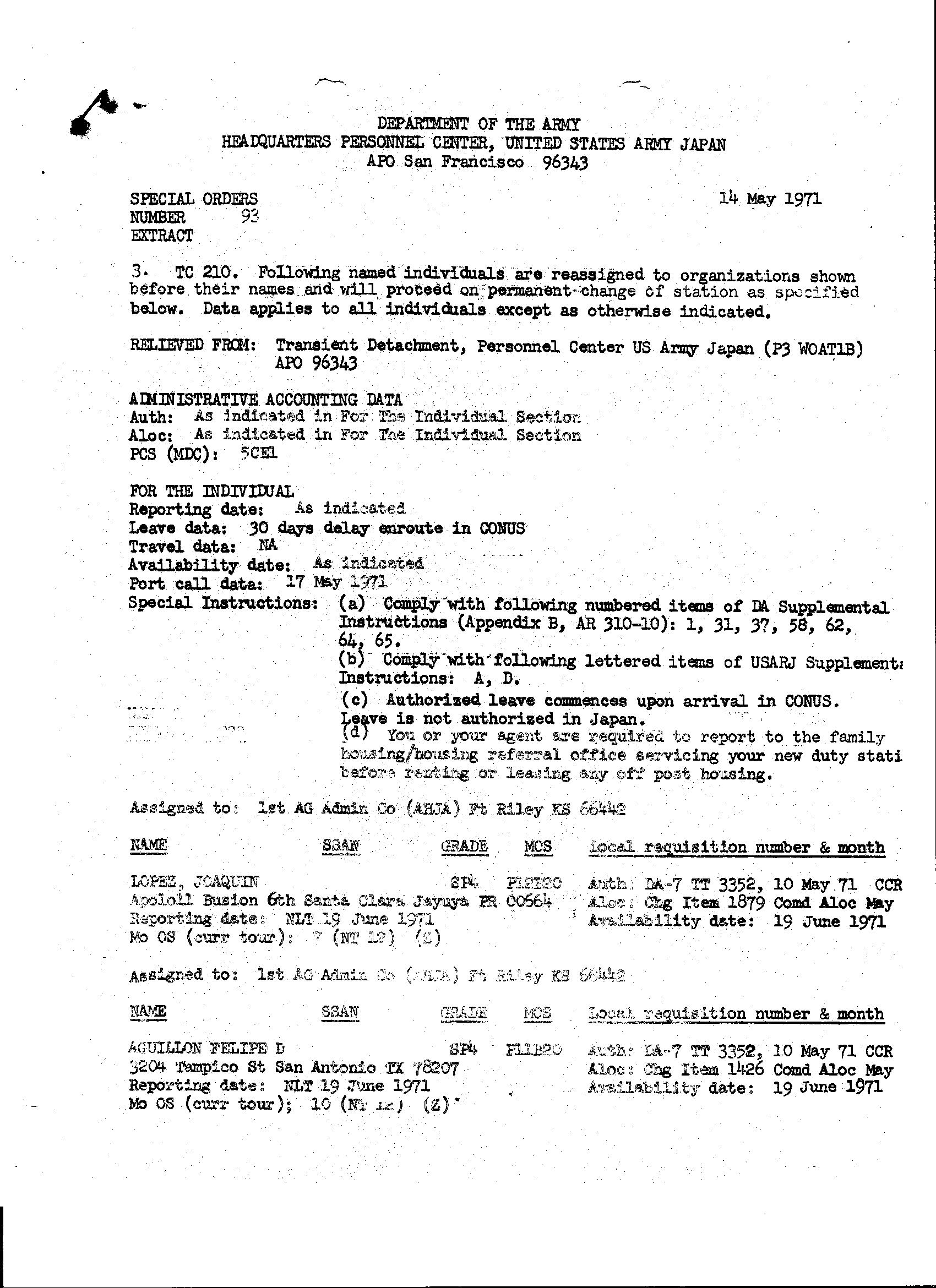
When did you meet you present wife?
I met my wife in 1990...(thinking) 4. 21 August in 94 and weíve been together ever since.
What's her name?
Her name is Elena and she is a really big part of my life and I have four daughters and two sons and life is good.

Where did you meet her?
I met her, believe it or not in a dance. I love to go dancing, me and my buddy, my best friend Bill Leal. We used to love go dancing and I met this young lady and she was there and started dancing and they're it is. Here we are, 13 years later.

Did she understand why you went to the wWar?
No. And and...
So was she part of it?
No, she was not part of it but now that we know of each other and stuff, we...sometimes I'll have reoccurring, I'll have bad dreams, nightmares. For instance, right now that you and I are having this interview, probably tonight I will not be comfortable...
Do you want to stop for a while?
YES!
Continuence of Interview.
And anyway, I apologize for that. Like we were having the interview now. I'll probably go home and my wife will probably say, "what's wrong with you?" And I'll say, well I did this and I won't be sleeping tonight and whatever. And it's really, it's been golly, 30 some what years but you never get out of it. To this day, I can not see a movie about Vietnam. I can not, you know, sit or listen to people or whatever. It's just. The only good thing about it, that I say it's good, is that now my soldiers, my cadets that are in the military and they come and they try to you know, find somebody to understand them and know what they're going through because of the pain and stuff. It's very, it comes in really handy because they understand and they know that I know what they went through and sometimes we just need a hug or sometimes, we need someone to know hey, I'm okay, your okay. But like I said before, you feel guilty because you came back and your buddies didn't. And now it's something that I could share with any fellow soldiers, and let them know that it's okay. That our job is to do what we have to do and it wasn't because we we're mean people or that we wanted to, it's just the profession that we've chosen and somone's gotta do it because we wouldn't have the freedom that we do.
How long did you stay in Vietnam?
About around 11 months. Like I said, it was right before I got sick and they send me to Japan. About 11 months.
Did your family understood about you going and fighting in the war?
Well, you know. I don't really know if the family was concerned about you going because like I said, it's really weird, everyone was joining. My brother joined before I did and stuff and okay, if my brother wants to do it, I can do it, and if my cousin wants to do it, I could do it. So, of course my mom was the one, really shaken up about it because she would have both of her sons at one time and besides the family, they were just proud of me. You know, they just wanted you to come back safe and if that's what you wanted to do, they would support you. It was pretty cool.
When you returned home, what changes did you notice towards others?
Changes, changes...well, the one thing that I noticed right off the back was that every time I would hear a loud noise like a firecracker I would, I would jump, I would get scared. Needless to say, 4th of July and New Year's were not my favorite days because you would hear all these, you know, commotions and stuff. But I don't know, I guess the people. When I came back, people were rude to us you know. I could remember going to Orange County, Texas coming back and stopped to get some gas and some white people there, I guess, they were rednecks or whatever, but they. They were really rude to me. They would call me names like spic, beaner, and taco bender and stuff. I really thought I was gonna fight myself out of there but, I was like, well, do I do this or do I just eat it and go. So I decided to let it go and went on my butt. But that was a really really bad time. It was worst than Vietnam I think. Coming back to Texas and you know, coming back from Texas and going through somthing like that.
Did you celebrate birthdays in Vietnam? How many?
One. I turned 19. If youíve ever heard that song Vietnam 19, 19 Vietnam, that was me. I graduated from Kennedy High School in San Antonio, Texas in 1969 and I celebrated my birthday on 21 November and we had this fire base called Fire Base 4-11. It was really cool. My mom send me a cake and some big red sodas, and some Fruit Loops and all these neat things that you couldn't get over there. It was a really neat birthday.
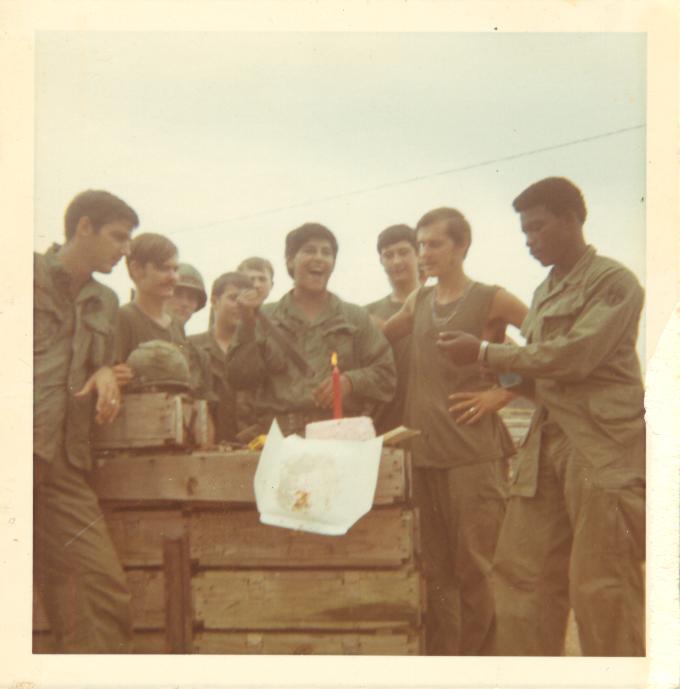
When you were in Vietnam, who did you think of the most? Why?
Probably my mom. My mom. Itís, it was just thatÖat the time, I had a girlfriend, but I didnít have a wife. I didnít have any kids and stuff and its basically your mom. You know, your friends. Not to much brothers and sisters, it's very weird because you know, always fighting with them, well we were because of the war and stuff. So probably my mom was the first I thought of the most. Making sure that I came back and make her proud and stuff, and that was about it.
If you had the choice, would you go to war again knowing what you have been through?
Yes, definitely, and this is very ironic. Earlier before you got here, I didnít know you were coming here today, but earlier before you got here, I was talking to one of the coaches and then the subject came up. You know, Iraq is going on and stuff and you wanna, would you go back and stuff and I would go back yesterday. I totallyÖbeing in the military of what we do, and what we try to accomplish and I would not have to think twice. In fact, I looked up on it when it first started and they said, ďnope, youíre a little to old.Ē But yeah, I would definitely do it again because I think the experience that we had and what we do would help the young soldier, so yeah. Most definitely.
Is there anything else you would like to add to this interview?
No. Basically just to thank you for taking the time and it's really. Like I mentioned in the beginning, although I donít really like to talk about it and stuff and Iíll be probably be thinking about this and probably losing a little bit of sleep but I think that its important that a young people like yourself know, you know a little bit about what we go through and how difficult it is because a lot of us think you know, you're watching TV and a lot of young people nowadays hear that young people are getting killed and what we go through. But they don't have the appreciation the freedom that we enjoy and the price. The truth, you know a lot of kids say that I won't joing and I won't do this but yet, they hear all the benefits from people all that young people soldiers, young ladies and young people that serve allow you to have the freedom and it's good to, to know that...somebody will pick this up and say wow, that's pretty cool, I didn't think that went over and. But yeah, I ended up staying in the Army for 24 years and I retired as a First Sergeant. The best times of my life and I would do it all over again.
Thank You
Thank you, I appreciate it.
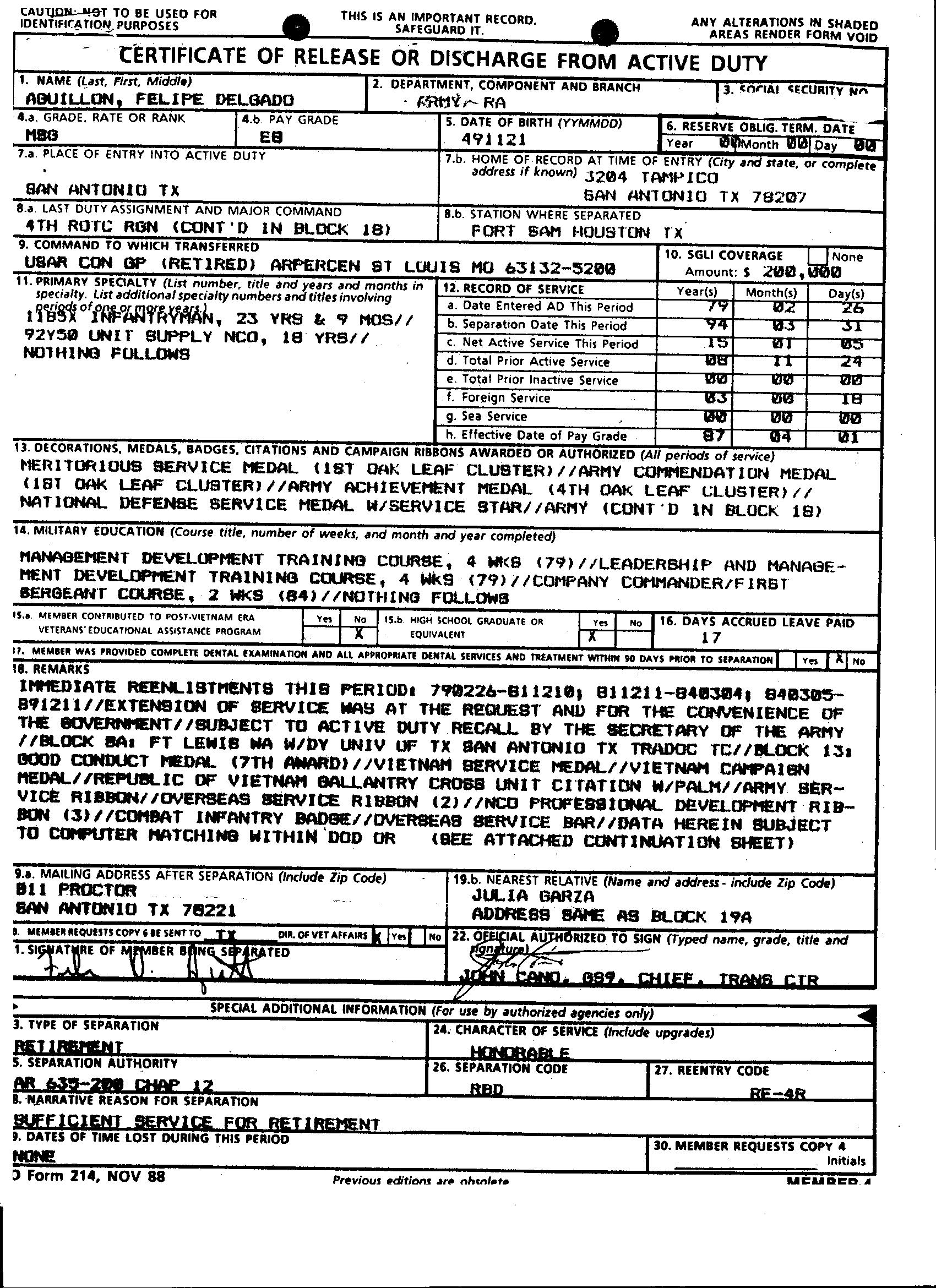
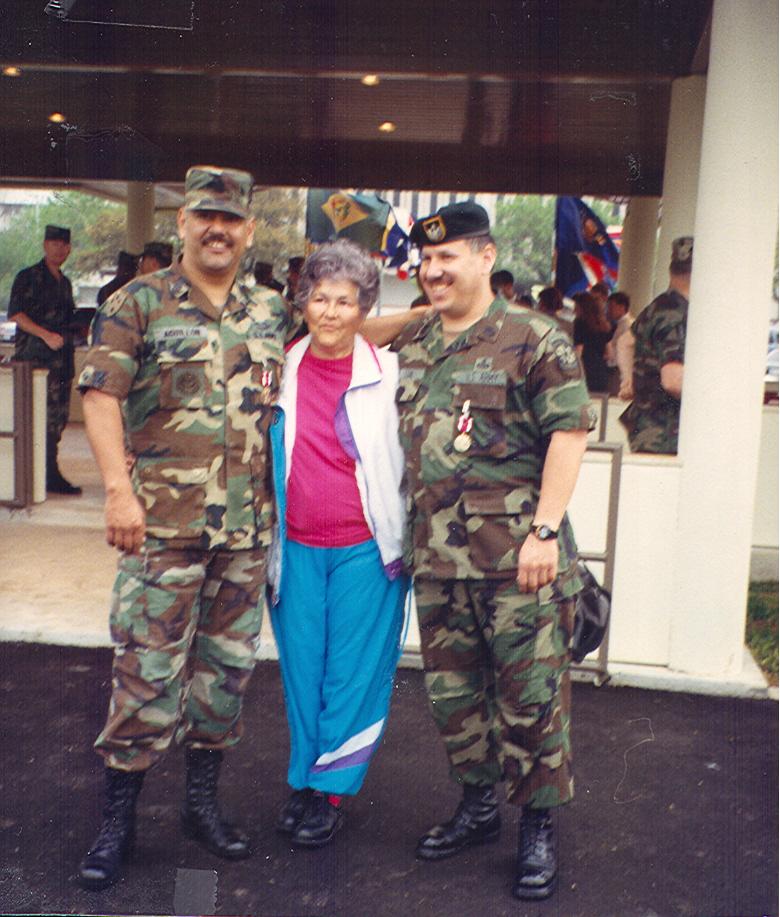
First Sergeant Felipe Delgado Aguillon was my First Sergeant during my four years at Memorial High School. The main reason I choose him to do my oral history project was becauase I had to know what really happened in the Vietnam War. The war was something that everyone wanted to stop from happening, but because it happened, many people have learned what it is like in the war. What I learned from this interview was how First Sergeant Aguillon went throught the Vietnam War and today, he acts as if nothing happened to him. This interview was hard for First Sergeant Aguillon because the memories affect him everyday. His wife Elena is his best friend and are very much in love even today. His family has been affected by their son's death, Matthew last year in 2005 and because of this, First Sergeant Aguillon and his famiy are stonger together now. The most important point of the interview that I think are important is how after dealing with the Vietnam War, he had a hand granade explode on his left eye. He was never wounded in the war and for this to happen after he left the war, it is very shocking. What I did learn from this interview are how they got the food and mail while being in the war. Off the interview, First Sergeant Aguillon told me that everytime his platoon needed food or was time for mail, they would have to secure the area for the helicopter. From here, the people who were in charge of the helicopter would have to throw big boxes from the air in a clear view plain in order to get what they needed. If the area was not secure enough to get what they needed, they would not receive their canned foods and their mail. This food that they ate were called crashes which is canned food. "It was delicious," First Sergeant told me. I also learned that he has received a number of medals. These medals are: Meritorious Service Medal (two awards); Combat Infantry Badge; Army Commendation Medal (six awards); Good Conduct Medal (eight awards); National Defense Service Medal; Vietnam Service Medal; Vietnam Camping Medal; Overseas Service Ribbon (two awards); Army Achievement Medal (four awards)and NCOPD ribbon. When the interview was done, First Sergeant was a bit hesitant about how we would start it and how the interview might have gone. At one point of the interview, we stopped interviewing because of all the memories that I had brought up with this interview. By listening to his stories and the way he expressed himself in each question made me feel sad because someone so nice had to go through something so horible. I remember reading something on one of the past oral history projects that said war was the last resort for freedom. The way I found out about these stories being true was by looking at photographs that he had in three huge albums that he keeps at his JROTC office at Memorial High School. The good things about this interview is to see how First Sergeant Aguillon went through a lot to have what he has now. But at the same time, bringing back depressed memories from the war is something that I wish I could have prevented. I do know that after this oral history project is done, many people will know how one person can make the difference to many people in the world. I am very proud of the way I was able to learn past history in this way because it has taught me that the past history someone has to offer is only waiting to be passed around. I am very happy that I can be the one to pass around the history of First Sergeant Felipe Delgado Aguillon.
.jpg)
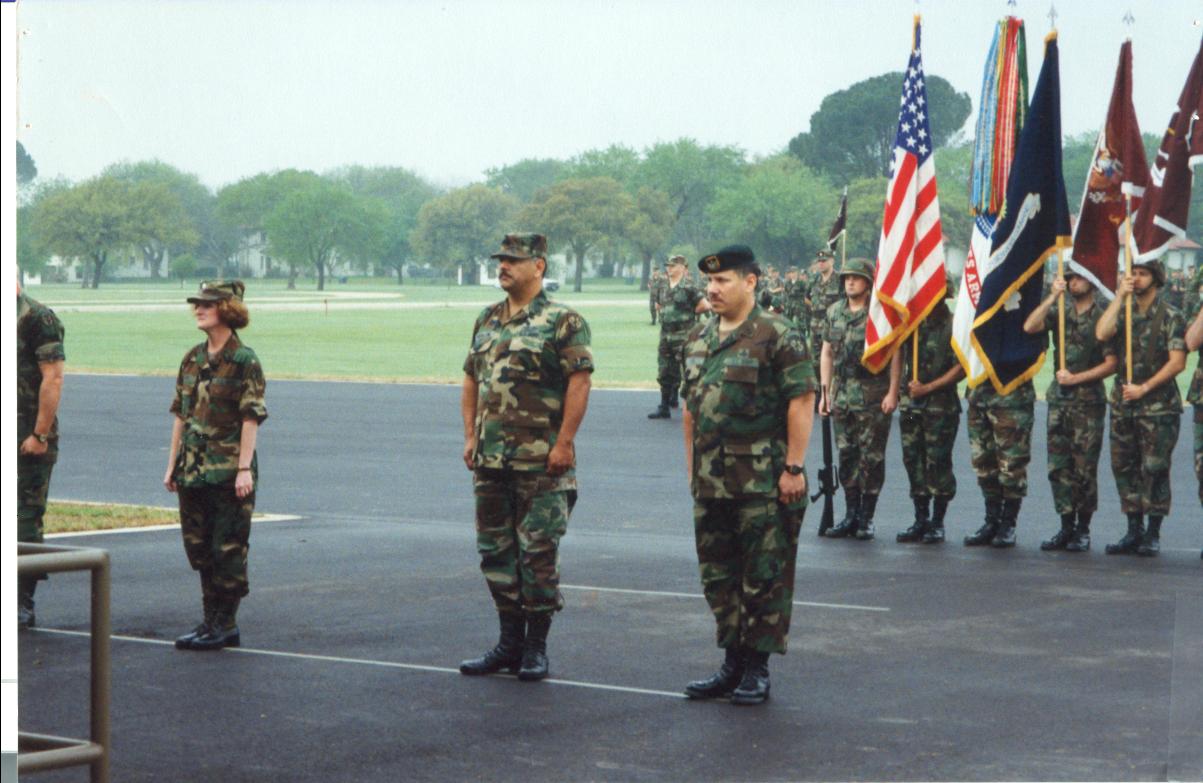
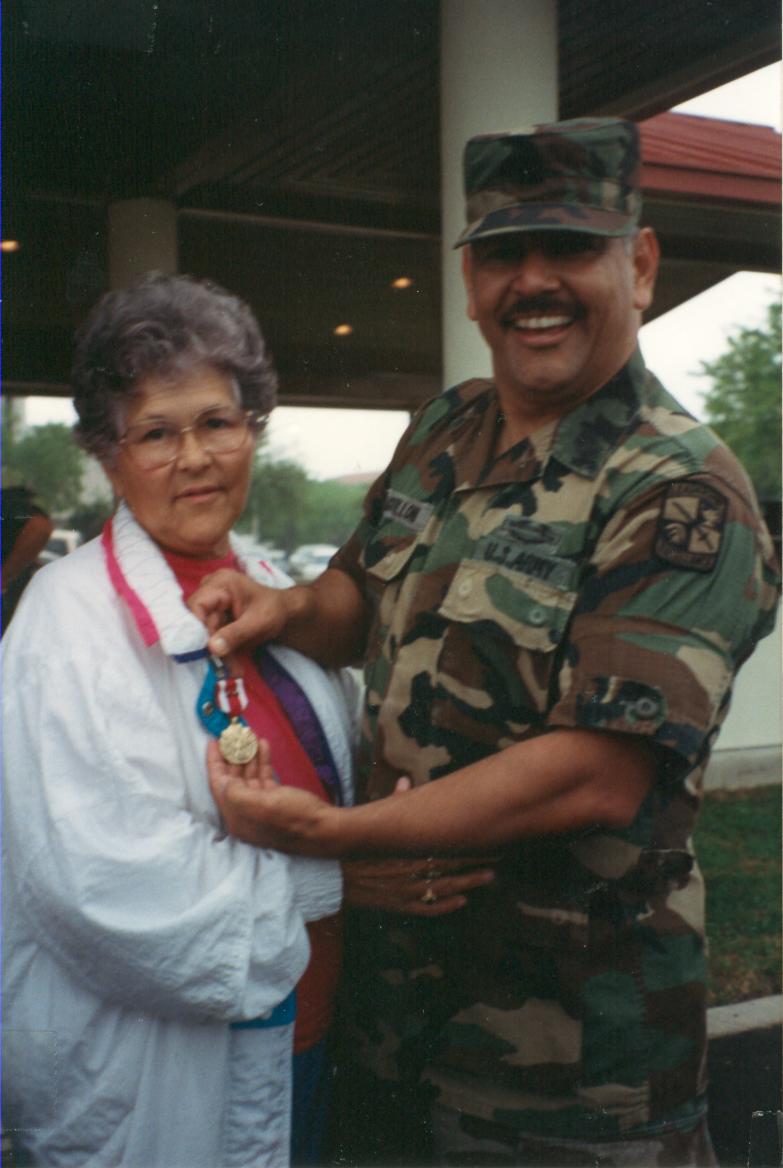
Basic Training at Ft. Lewis, Washington. http://www.lewis.army.mil/lewis-vietnam.asp. This site has a range of history of how it was during a particular War. I choose this site becasue it is nice to know the difference between Ft. Lewis during Vietnam and how it is today.
Domino Theory http://www.vietnam-usa.org/1955gb.html. This site tells you what the a domino theory was and how President Eisenhower came about to make this theory.
Sequence Number. http://www.cnn.com/SPECIALS/cold.war/episodes/13/the.drafts/ This site gives you the ability to show you if you would have been drafted to the Vietnam War.
Cleveland, Dr. Les. Copyright 1986.Cadences/Songs used during Vietnam War. http://faculty.buffalostate.edu/fishlm/folksongs/les02.htm. This site is something incredible. It is able to show you songs that they used while the Vietnam War was taking place. It also tells you the feelings of other people that were envolved in any way.
Vietnam Casualties. http://vets.appliedphysics.swri.edu/statewall/texas/tx_page92.htm. This site is a sad but useful thing that I encountered. It tells you what people died because of the War of all the 50 states in America.
Article 15. http://www.wood.army.mil/sja/TDS/article_15_fact_sheet.htm This article gives you the meaning of an Article 15 and what someone can do to get this Article.
E1 Insignia. http://www.defenselink.mil/specials/insignias/enlisted.html. This site gives you the insignias of and E1 to E9. It also gives you the ranks from the other branches of the Military.
Maintained by Webmaster. Updated April 23, 2000.Rambo. http://members.tripod.com/~tmills13/fblood.htm This is the official site of the Rambo trilogy movies for all the Rambo fans outthere.
Orion Safety Products. Copyright 2000. Flares. http://www.orionsignals.com/Marine/Products/handheld.html. This site gives you kits and a variety of handheld flares that anyone may need for a camping trip.
1st Sergeant Aguillon. http://www.hill4-11.org/rosters/cco-3rd-1st.html This is the site that I encountered while reserching for Vietnam. It gave me the nickname, time 1st Sergeant left to the War and many other things.
Talk Medical. Copyright 2004. Med-Vac. http://www.talkmedical.com/medical-dictionary/8928/Medvac. This site gives you the official meaning of what Med-Vac means.
